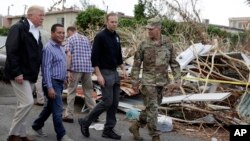White House press secretary Sarah Sanders says President Donald Trump is committed to disaster relief for hurricane-ravaged Puerto Rico, according to the Reuters news agency.
Sanders issued the statement hours after President Donald Trump said that government response teams could not remain in the U.S. territory indefinitely.
“… We cannot keep FEMA, the Military & the First Responders, who have been amazing (under the most difficult circumstances) in P.R. forever!,” Trump tweeted Thursday morning.
Trump also cited Sharyl Attkisson, a television host for the Sinclair Broadcasting Group, as suggesting the island shared in the responsibility for its dire financial situation.
"Puerto Rico survived the Hurricanes, now a financial crisis looms largely of their own making," says Sharyl Attkisson. A total lack of.....
...accountability say the Governor. Electric and all infrastructure was disaster before hurricanes. Congress to decide how much to spend....
Reuters also cited the White House as saying it is working with the island’s governor and the U.S. Congress on the government’s response.
Puerto Rico's financial situation has worsened over a period of time, prompting the territory to file for bankruptcy in May and work with Congress to restructure more than $120 billion in debt. After Hurricane Maria destroyed much of the island, Puerto Rico's financial crisis escalated into a humanitarian one.
Recovery has been slow, leaving many of the island’s 3.4 million residents without basic services such as running water and power.
The U.S. Department of Defense said Wednesday 89 percent of the island's residents were still without electricity two weeks after Maria made landfall. About half of the residents had cellular service, according to a website created by the Puerto Rico government. As of Tuesday, 43 of Puerto Rico's 72 hospitals were operating with power.
The death toll from Maria has climbed to 45 and 113 people remain unaccounted for, according to Puerto Rico's Department of Public Safety spokeswoman, Karixia Ortiz.
At a White House media briefing, Chief of Staff John Kelly said, “Our country will stand with those American citizens in Puerto Rico” but added the Federal Emergency Management Agency is “not going to be there forever.”
Puerto Rico Governor Ricardo Rossello earlier had a restrained response to the president's comments.
“The U.S. citizens in Puerto Rico are requesting the support that any of our fellow citizens would receive across our Nation,” Rossello said.
Rossello's muted response was in sharp contrast to that from Carmen Yulin Cruz, the mayor of Puerto Rico's capital, San Juan.
“Tweet away your hate to mask your administration's mishandling of this humanitarian crisis. While you are amusing yourself throwing paper towels at us, your compatriots and the world are sending love and help our way,” Cruz said in a letter to Trump.
Cruz's letter added, “I ask the United Nations, UNICEF and the world to stand with the people of Puerto Rico and stop the genocide that will result from the lack of appropriate action of a President that just does not get it because he has been incapable of looking in our eyes and seeing the pride that burns fiercely in our hearts and souls.”
Senate Democratic Leader Chuck Schumer also responded to Trump's latest tweets, saying the island's residents deserve to have the full support of the U.S. government, as did Texas, Florida and other southern U.S. states that were stricken recently by hurricanes Harvey and Irma.
“There is still devastation, Americans are still dying. FEMA needs to stay until the job is done,” Schumer wrote on Twitter.
Like Schumer, Rossello has also emphasized the island's residents are Americans — as he did last month when he issued a plea for federal assistance.
“Puerto Rico, which is part of the United States, can turn into a humanitarian crisis,” Rossello said. “To avoid that, recognize that we Puerto Ricans are American citizens. When we speak of a catastrophe, everyone must be treated equally.”
Although Puerto Ricans are U.S. citizens they, like residents of other U.S. territories, cannot vote in general presidential elections unless they become residents of one of the 50 states.
According to the U.S. National Archives and Records Administration, these citizens “cannot vote in the presidential election” unless they have official residency in a U.S. state or the District of Columbia."
Despite their inability to vote in presidential elections, the U.S. Immigration and Nationality Act says people born in Puerto Rico have the same birthright citizenship as anyone born in the 50 states.





